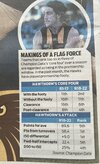RedmanWasHere
Rarely in kitchens at parties.
- Aug 23, 2010
- 27,014
- 29,907
- AFL Club
- Essendon
- Other Teams
- Exers, Gryffindor, Rich+Ess AFLW, Tassie
A question for the masses.
With Nick Daicos becoming the first VFL/AFL player born in 2003 to play in a premiership, dating back to 1897, who was the first premiership player per year of birth?
With Nick Daicos becoming the first VFL/AFL player born in 2003 to play in a premiership, dating back to 1897, who was the first premiership player per year of birth?





